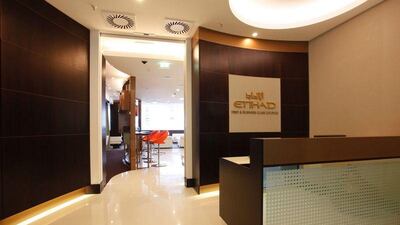Etihad Airways is pressing ahead with a strategy to build up its business-class appeal with lounges in overseas airports even as demand for premium cabin seats declines. The airline opened a premium lounge this week at Frankfurt Airport, to be followed by another lounge at Heathrow in London in September, as figures from the International Air Transport Association (IATA) showed sales of economy seats grew in May while premium tickets fell. Business class traffic between Middle East to Europe was down 10.8 per cent in May, while sales of economy tickets rose by 7.3 per cent, IATA said. Similarly, business tickets between the Middle East and Far East were down 12.3 per cent while economy passenger numbers on the same flights were up 11.6 per cent. The statistics highlight the difficult choices airlines face in catering to a short-term boom in economy travel while also being ready for a return by business travellers once the global recession eases. Premium passengers are vital to the airline industry, making up 25 to 30 per cent of revenues, but only 7 to 10 per cent of passenger numbers. Because of their contribution to the bottom line, business travellers are increasingly being courted with amenities served outside the plane, such as chauffeured pickup and drop-offs and premium lounges. In the Middle East, the big three long-haul specialists, Emirates Airline, Qatar Airways, and Etihad, have for years been winning over customers from Asian and European airlines thanks to their newer aircraft and luxury offerings. IATA said ticket sales on direct flights between Europe and the Far East fell more than 10 per cent in May, partly because airlines such as Etihad and Emirates were increasing market share and rerouting travellers over their Middle Eastern hubs. Peter Baumgartner, the chief commercial officer of Etihad Airways, said: "The opening of the new Frankfurt lounge marks the beginning of a gradual roll out of Etihad lounges across the airline's network which will all offer the same high quality look and feel." The lounge plan comes after other big investments this year, including the opening of luxury business and first-class lounges at Terminal 3 in Abu Dhabi, the roll-out of new seats in its first class cabins, and a major sport sponsorship deal with Manchester City Football Club in May. However, as Etihad continues to invest in its brand, it has been forced to accept lower prices from passengers, because of an industry-wide fares battle. Average UAE air fares are down more than 20 per cent this year. The latest business class fare on Etihad between Abu Dhabi and London, for example, was D12,755 (US$3,475), up from a year-to-date low of Dh8,455 in May, but well off the Dh16,270 asking price when demand was stronger in January. Emirates Airline, which reported a yearly profit of Dh982m in May, has fared better than many rivals because of its emphasis on the economy cabin, said Tim Clark, its president. Carriers that devoted large sections of their cabins to business class seats are the ones suffering the most, Mr Clark said. "That business has gone away. Fortunately for us, we never fell into that trap." Up to early June, the airline was carrying 13 per cent more passengers than the year before, Mr Clark said, primarily thanks to demand in the back of the plane. "We always had a high ratio of our income come from the economy cabin and that is why, for instance, we had 10 abreast on the [Boeing] 777, and most carriers have got nine. So we have far more seats in the real estate equations of the aeroplane than most other carriers do," he said. Another luxury full-service airline, Qatar Airways, also took steps to sell more economy-class tickets, by removing its premium lounges on Airbus A340-600 aircraft in April to make way for economy seats. igale@thenational.ae

Etihad's Frankfurt premium lounge the first of a worlwide rollout
Etihad Airways opened a premium lounge at Frankfurt Airport, its first outside of the UAE.
Most popular today
